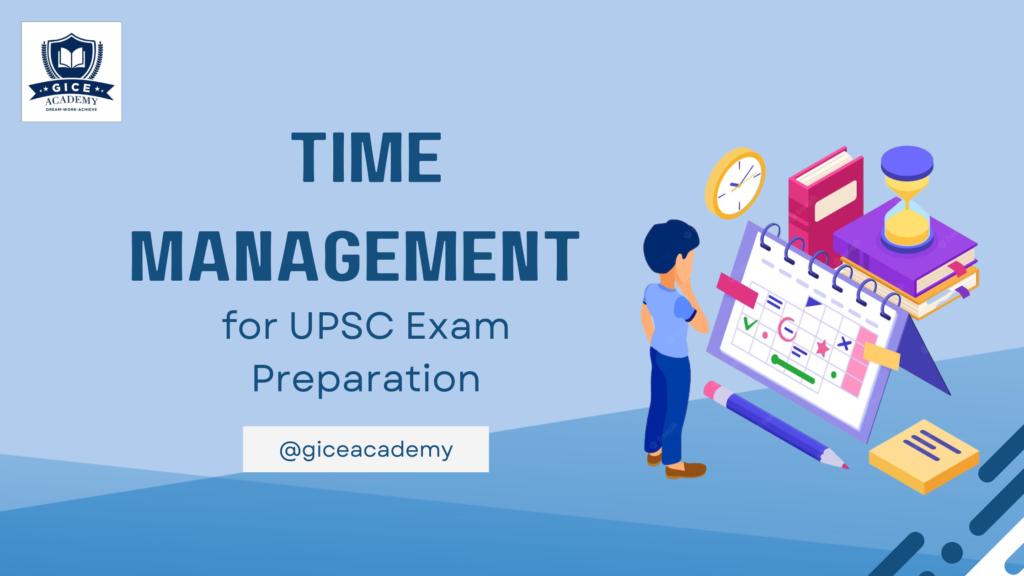
Table of Contents
Importance of Time Management for UPSC Exam Preparation
As an aspirant for the Union Public Service Commission (UPSC) exam, you’ve probably been wondering how to juggle the extensive syllabus while maximizing your effectiveness. This article offers you a roadmap with detailed strategies for impeccable time management during your UPSC exam preparation. So let’s dive right in!
1. Harness the Power of Prioritization in UPSC Preparation
The UPSC syllabus is vast, and time is finite. So, prioritization becomes the key. Prioritizing doesn’t merely mean focusing on what’s important, but it also implies dedicating more time to those topics that pose more challenges or hold more weightage in the examination.
For example, if Indian Polity is a topic where you stumble frequently, assign more hours to it in your study timetable. On the contrary, if you’re already confident with Modern History, allot less time to it but make sure you keep revising to maintain the grip.
2. Break it Down: Embrace the Art of Micro-Scheduling
The approach of micro-scheduling involves slicing your day into small, manageable units and allocating specific tasks to these units. Instead of creating a broad weekly or monthly schedule, hone in on the day-to-day timetable.
To illustrate, you can break your study hours into 30 or 60-minute slots. You can assign a particular subject to each slot, thereby ensuring variety and avoiding monotony. Also, you’ll have a clearer vision of what needs to be accomplished in a specific day.
3. Set Realistic Goals and Maintain a Progress Track
While setting goals, remember to keep them SMART – Specific, Measurable, Achievable, Relevant, and Time-bound. Unrealistic or vague goals can lead to stress and burnout. Similarly, always keep track of your progress to maintain a clear understanding of your standing.
For instance, if your goal is to complete the entire UPSC syllabus in 6 months, divide this into smaller objectives, such as completing a specific chapter or topic within a designated time frame. Then, regularly check your progress against these smaller objectives.
4. Effective Utilization of Short Breaks: A Strategy for Continual Efficiency
Short, regular breaks during study hours can significantly enhance your productivity. Plan these breaks intelligently so they serve as a refresher without pulling you away from your study trajectory.
A practical example of this is the ’20-20-20′ rule. Every 20 minutes, take a 20-second break and look at something 20 feet away. This can help reduce digital eye strain if you’re studying on a screen. Another example is doing a quick physical activity like stretching or a brisk walk during a break to get your blood flowing and refresh your mind.
5. The Pomodoro Technique: An Effective Time Management Tool for UPSC Aspirants
The Pomodoro Technique is an acclaimed time management method that involves studying for a set period (usually 25 minutes), known as one ‘Pomodoro’, followed by a short (5-minute) break. After completing four ‘Pomodoros’, take a longer break. This technique promotes deep focus while mitigating mental fatigue.
For example, let’s say you’re studying Modern History. Use a timer and commit to intensive studying for 25 minutes, then take a 5-minute break to refresh your mind. Repeat this cycle for an effective study session.
6. Creating a Balanced Approach between GS and Optional Subjects
A tricky aspect of UPSC exam preparation is managing the General Studies (GS) and the Optional subjects. Both have different weightage and demand distinct preparation strategies.
For instance, you may be good at Geography (your optional
subject), but don’t overlook the significance of GS papers. Create a balanced timetable where you allot ample time for both GS and Optional preparation, adjusting according to the demand of the subjects and your proficiency level.
7. Regular Revision: Unlocking the Door to Long-term Retention
Regular revision is not merely a strategy; it’s a necessity for long-term retention of knowledge. Build your timetable in such a way that revision becomes an integral part of your routine.
For example, if you study a new topic today, allocate some time the following day to revise it. This will reinforce the information and help you retain it longer.
8. Leveraging Mock Tests and Previous Year Question Papers: Time Management Practice in Real-Time
Practicing with mock tests and previous year question papers can familiarize you with the exam pattern, type of questions, and help in honing your time management skills for the actual exam.
For instance, you could set a timer and try to complete a mock test within the allotted time. This gives you a real sense of the exam scenario and helps you gauge your speed and accuracy.
9. Time Management on the UPSC Examination Day
Proper time management is not only crucial during preparation but also on the D-day. Be aware of the marking scheme, prioritize questions based on your strengths, and keep a vigilant eye on the clock.
An example would be to first attempt those questions in the paper that you are most confident about. This can save time for tougher questions and reduce the chance of missing out on scoring opportunities.
10. Don’t Neglect Your Health: The Foundation of Effective Time Management
Remember that a healthy mind resides in a healthy body. So, don’t overlook your physical and mental well-being in the quest for UPSC success. Adequate sleep, a balanced diet, and regular exercise should form part of your routine.
For instance, incorporate at least 30 minutes of physical activity into your daily routine, and ensure you are getting 7-9 hours of sleep each night. Additionally, include brain-boosting foods like almonds, blueberries, and avocados in your diet.
Conclusion
Mastering time management for your UPSC exam preparation is not just about studying hard, but studying smart. Through effective prioritization, micro-scheduling, setting realistic goals, utilizing breaks, adopting techniques like Pomodoro, maintaining a balanced approach between GS and optional subjects, regular revisions, mock tests, and taking care of your health, you can maximize your preparation efficiency. Remember, the journey to cracking the UPSC exam may seem like a steep mountain, but with these time management strategies, you can climb it one step at a time, steadily and surely!
FAQ’s
What is the first step towards IAS preparation in terms of time management?
The first step towards IAS preparation in terms of time management is creating a realistic timetable. This timetable should not be too strict but should provide a structured approach to your study routine.
How should I set my study targets for effective time management?
You should set short, practical, and achievable targets for your study. This means breaking down your overall study goals into smaller, manageable tasks that can be accomplished within a set timeframe.
What is the concept of ‘Divide and Study’ in UPSC exam preparation?
The concept of ‘Divide and Study’ in UPSC exam preparation refers to breaking down the vast syllabus into smaller sections or topics and studying them one at a time. This approach makes the syllabus less overwhelming and more manageable.
How can I organize my study time effectively for UPSC preparation?
You can organize your study time effectively for UPSC preparation by having a daily planner and a monthly calendar. These tools can help you divide your study hours among different subjects and topics, ensuring that all areas of the syllabus are covered.
When should I decide to give up on a particular topic during my UPSC preparation?
You should decide to give up on a particular topic during your UPSC preparation when you’ve spent a significant amount of time on it but are still unable to understand or remember it. It’s important to focus on topics you can master and not waste too much time on ones that are overly challenging.
How can a daily planner and a monthly calendar help in my UPSC exam study?
A daily planner and a monthly calendar can help in your UPSC exam study by providing a visual representation of your study schedule. They can help you track your progress, manage your time effectively, and ensure that you’re consistently working towards your study goals.
What are some effective tips on time management for UPSC preparation?
Some effective tips on time management for UPSC preparation include sketching out a proper study schedule, dividing your study material into manageable sections, and setting realistic goals for your study.
How can I stay focused while preparing for UPSC?
You can stay focused while preparing for UPSC by maintaining a regular study routine, taking short breaks to avoid burnout, and using techniques such as mindfulness and meditation to improve your concentration.
What is the best time for UPSC coaching?
The best time for UPSC coaching depends on your personal schedule and preferences. Some people prefer morning classes, while others find evening classes more convenient. It’s important to choose a time that allows you to fully concentrate and absorb the material being taught.
How important is self-study and how many hours should I dedicate to it daily for UPSC preparation?
Self-study is a crucial aspect of UPSC preparation. It’s recommended that you dedicate 8-10 hours of self-study daily. This time should be used to revise the material covered in coaching classes, practice answering questions, and read up on current affairs.



